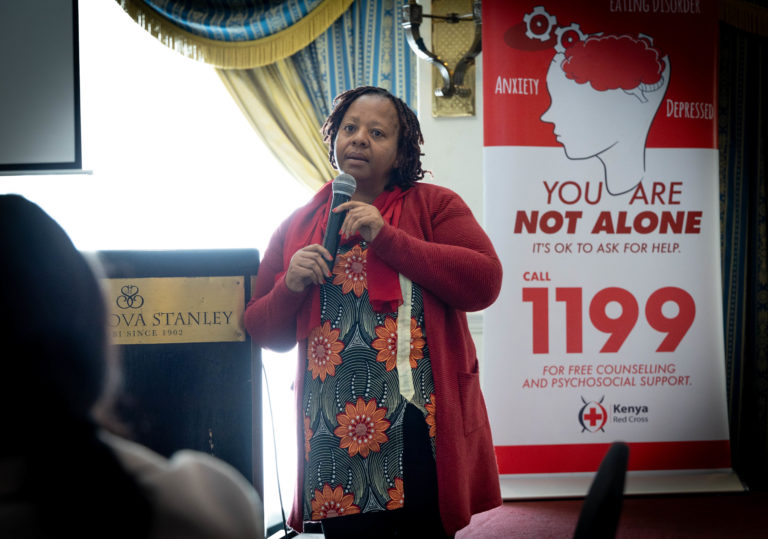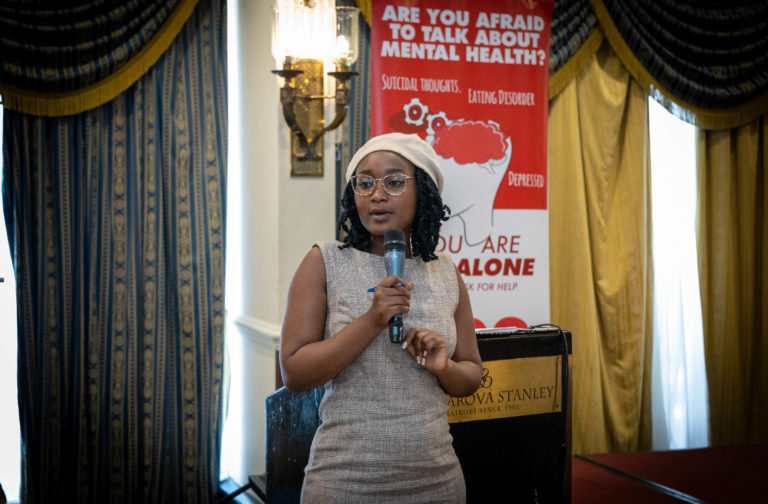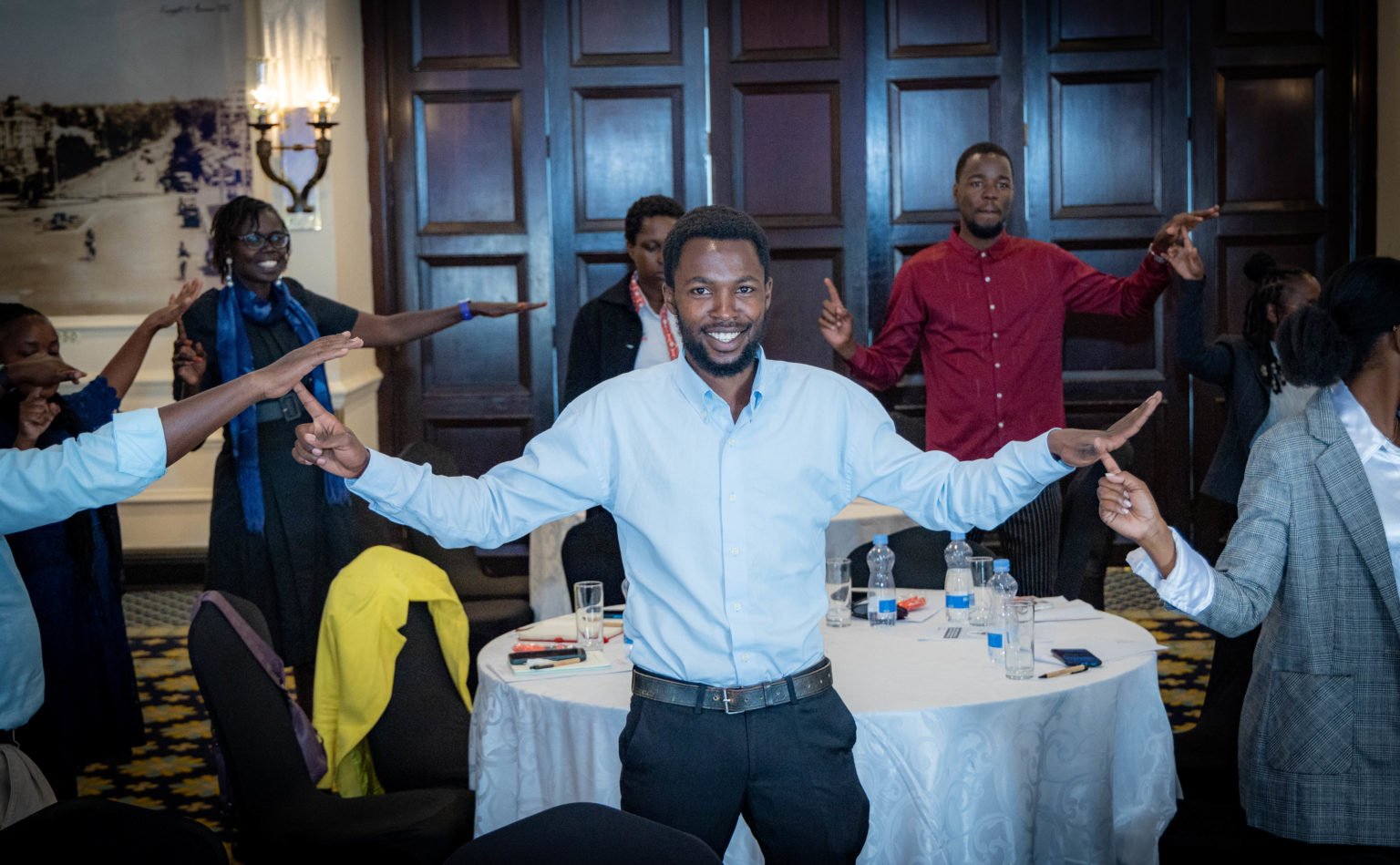Not long ago, taking care of the mental health of survivors and people in distress would be considered secondary, but thankfully times are changing – and with this new framework, developed with invaluable support from the Danish Red Cross and IFRC – it will change faster as MHPSS will be an organized component of any emergency response moving forward.”
– Dorothy Anjuri, Head of the Health, Nutrition and Social Services Department (HoD), Kenya Red Cross Society
Ending the year with a much-anticipated achievement, the Kenya Red Cross Society (KRCS) Mental Health and Psychosocial Support (MHPSS) unit orchestrated a three-day workshop in the heart of Nairobi’s Central Business District. Gathering over 50 mental health and psychosocial support practitioners, including psychologists, health workers, and officials from the Kenyan Ministry of Health and Nairobi City Council, for the dissemination of a new KRCS MHPSS framework.
The framework, set to launch in the first quarter of 2024, represents a significant stride towards reshaping emergency response strategies by integrating organized and coordinated MHPSS services provided by the Red Cross and their partners in the healthcare sector.
The workshop, set in a dimly lit conference room at the Sarova Stanley Hotel was opened by KRCS Head of the Health, Nutrition and Social Services Department (HoD), Country Manager, Dorothy Anjuri who greeted participants with gratitude and bright optimism: “Not long ago, taking care of the mental health of survivors and people in distress would be considered secondary, but thankfully times are changing – and with this new framework, developed with invaluable support from the Danish Red Cross and IFRC – it will change faster as MHPSS will be an organized component of any emergency response moving forward.”

Following the opening remarks, the workshop activities began, led by John Kimura – a Clinical Psychologist and Head of the KRCS MHPSS unit, with presenting the IFRC principles behind the framework, the three overarching strategic goals of the framework: 1) Communities can anticipate, prepare, and respond to and quickly recover from crises, 2) Communities lead healthy lives and have opportunities to achieve social, economic and psychosocial well-being, and 3) Youth to lead positive change in their communities, and the dissemination plan of the framework.
With the fundamentals of the first day behind the participants, the second day of the workshop had interactive plenary discussions on pressing mental health areas that have suffered from little or no prioritization and limited resources such as trauma-informed care and suicide prevention.
The Kenyan suicide numbers are alarmingly high with approximately 11.2 suicides per 100,000 population, especially among youth and men, which Wendy, a Counseling Psychologist with the KRCS MHPSS unit, echoed as she circled the tables full of her peers nodding their heads in shared experience: “When I pick up the phone [the KRCS toll-free helpline: 1199] and I hear a man on the other end of the line, I always open the conversation with congratulating him for calling – a suicide-threatened man calling for help is facing a lot of discrimination. The mental health needs of Kenyans – and Africans – first of all, is about recognition. Mental health has not been taken seriously for a while, even in big organizations, it’s an invisible pain that people can’t see, and what people can’t see, they don’t understand, and what you can’t understand you ignore, but with this framework, we will address and counter the suicide rates through structured programming and implementation as well as influence policies and shed light on the importance of prioritizing mental health interventions” (Soony Wendy, Counseling Psychologist, KRCS MHPSS unit).

Wendy, together with John Kimura, Head of the MHPSS unit, and three other psychologists, Leyla, Pius, and Peter, form the KRCS MHPSS unit, and they respond to all inquiries and requests for aid or help related to MHPSS received through the well-known KRCS helpline which is open for calls all.
During the suicide-prevention session, the microphone was shared between frustrated healthcare workers who work with suicide-threatened persons: “When we can’t open up and talk about our mental health conditions, we, as a society, are normalizing the effects – and the consequences are serious, ranging from stress to severe stress to depression to an increasing suicide rate among adolescents – especially male adolescents – our young brothers and sons are taking their lives because they are hopeless and they think that they are alone in it” (Stella, Psychiatric Nurse at Mathari National Teaching and Referral Hospital)
Besides efforts to destigmatize suicide, the new framework will also streamline referral mechanisms including cooperation with the Kenyan Ministry of Health and the 47 counties, enhance community-based MHPSS, structure and standardize MHPSS services, ensure capacity-building of Red Cross volunteers who provide psychosocial support (PSS), as well as self-care and debriefing sessions for all volunteers – who often forget their own needs when they tend to the needs of others.
The focus of the third and last day of the workshop was ‘caring for staff and volunteers’ and the importance of prioritizing and ensuring care for the carers: “Red Cross volunteers go out of their way, into harm’s way, to help others. They are the very foundation of the Red Cross, which is why the new framework has a comprehensive Caring for Staff and Volunteer component that introduces the promotion of self-care techniques, de-briefing group sessions, and follow-ups to prevent burnout and empathy fatigue. This is very important to KRCS and it aligns the MHPSS unit and our work with the overall KRCS Strategic plan (2021-2025), the IFRC MHPSS Roadmap, and the laws of Kenya” (John Kimura, Clinical Psychologist and Head of the KRCS MHPSS unit).
The need for taking care of staff and volunteers was reiterated by Guleed Dualeh, MHPSS Technical Advisor for the anglophone African region with the IFRC Reference Centre for Psychosocial Support (the PS Centre) as he joined the workshop online: “The Red Cross and Red Crescent volunteers are the very embodiment of the Movement and we (the PS Centre) exist to ensure their well-being. We provide capacity-building workshops for all National Societies, and we welcome staff and volunteers to reach out for support and become part of our Community of Practice (CoP) where MHPSS practitioners can share their lessons learned, challenges, achievements, and what actually work – and doesn’t work – in specific and local contexts” (Guleed Dualeh, MHPSS Technical Advisor, PS Centre).
The last hours of the fruitful workshop concluded with a feedback session on the workshop as well as the framework and it was clear that the framework has been long-awaited: “I am excited to see the framework being launched and implemented because it will help us provide better care and basically get our ‘house in order’ and what I especially take with me from the workshop is ‘you cannot pour from an empty jug’ because if we are to be able to continue to provide PSS for others, we need to take care of us too. Prioritizing and honing self-care skills is vital for our work and the new framework will support us” (Onyango Nathan, KRCS volunteer).
Developing the framework has been an ongoing activity since 2020 when the need for MHPSS services skyrocketed at the onset of the COVID-19 Pandemic.
Peter Hagono, a Counseling Psychologist on the KRCS MHPSS team, operated the helpline in 2020: “As the pandemic unfolded, the requests for MHPSS services were overwhelming and through the roof. People were losing loved ones, their jobs and their income, stuck in a curfew, worried and anxious for the future with no one to talk to. We realized we had to upscale our work, and this is when the framework began taking form, and therefore being here at the workshop today, disseminating the framework to all these passionate MHPSS practitioners, is a noteworthy achievement”.


